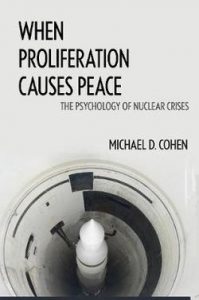North Korea, nuclear weapons and the threat to the Indo-Pacific
On 19 June 2018 the Institute hosted the launch of Dr Michael Cohen’s book When Proliferation Causes Peace: the Psychology of Nuclear Crises (Georgetown University Press, 2017). Dr Cohen, senior lecturer at the ANU College of Asia and the Pacific, examines how acquiring nuclear weapons has historically led states to adopt two sequential responses: a phase of political aggression and posturing, followed by diplomacy and international cooperation. His arguments draw on three key precedents: the Suez Crisis of 1956, the Cuban Missile Crisis of 1962 and the India-Pakistan standoff of 2001, all of which, despite periods of heighted aggression and potential nuclear escalation, eventually facilitated summits and diplomacy.
The question that Dr Cohen asks is how international discourse and debate can facilitate the latter response in the case of North Korea. At the recent summit between US President Trump and North Korean President Kim Jong-un, Trump had given Kim “something for nothing”: by agreeing to meet with the North Korean leader, the US president had in effect recognised the North Korean government, a recognition denied by the US for the 65 years since the end of the Korean war. Further, by linking North Korean denuclearization with the suspension of US military exercises in the region, Trump had given the North Korean nuclear program a measure of legitimacy. Dr Cohen saw a risk that the North Korean leadership may become emboldened by recent international respect and continue to engage in brash political behaviour rather than consolidate its recent shift toward diplomacy.

Dr Cohen foresaw five possible outcomes from the summit.
The first, denuclearisation of North Korea, was the least likely. It is the very possession of nuclear weapons that has been the catalyst for international attention and respect. In any case, whatever favourable deal North Korea might strike with the Trump administration risked being renounced by his successor – or indeed by Trump himself. Therefore, it is likely that the regime recognises that the complete relinquishment of their nuclear weapons, given both the advantage they present as well as the security they ensure, would be a strategic error.
The second and third outcomes relate to the degree of arms control that may be imposed on North Korea. Whether extensive or limited, arms controls pose logistical challenges given the difficulty in achieving meaningful verification with a country as unwilling as North Korea to show transparency. Ineffective arms control also had the added complication of effectively representing a desertion, if not politically then symbolically, of South Korea and Japan by the US: the US alliance with Japan and South Korea was “under the bus” if North Korea kept its nuclear tactical weapons, even if it agreed to abandon long-range weapons with the potential to reach the US (or Australia).
The forth scenario, war, could result if small localised attacks were to be misinterpreted and were to lead to escalation and retaliation. North Korea’s numerous tests had demonstrated the regime’s apparent enthusiasm to put its arsenal to practical use.
The fifth, a continuation of the status quo, is argued by Dr Cohen as the most likely scenario. North Korea will do all it can to prevent the expansion of US power projection in the Asian region whilst benefiting from the de facto legitimisation of its nuclear capability.
Unsurprisingly, Dr Cohen’s talk generated a substantial degree of debate. In his responses he acknowledged that any optimism should be tempered with the recognition that, although the talks could be indicative of the types of diplomacy and flexibility other nuclear powers had demonstrated, there were many unpredictabilities in the case of North Korea. He agreed that the Trump administration had been influenced by its poor domestic standing in seeking a breakthrough with North Korea.

Report by Michael Nguyen
AIIA NSW intern